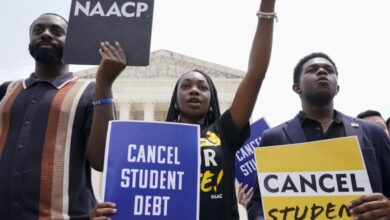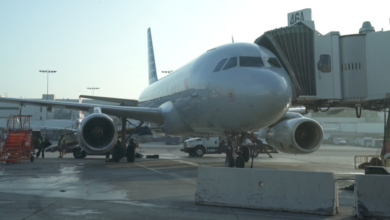
Ohioans on Tuesday began registering for the Vax-a-Million lottery and a chance to claim $1 million cash prizes or college scholarships if they can prove receiving at least one COVID-19 vaccination shot.
Drawings for the lottery, designed to combat vaccine hesitancy, are scheduled to take place on five consecutive Wednesdays starting May 26 on live TV.
"We have heard that local health departments and pharmacies are seeing more people coming in to get vaccinated," Gov. Mike DeWine said. "This is great news!"
The plan initially called for using voter registration records to choose winners for the cash prize, but state officials have opted for a online registration or toll-free number instead. By opting-in, winners will agree to have their vaccination records verified and be publicly announced, state officials said. Ohio residents who are 18 or older, have received at least one vaccine dose and registered for the drawing are eligible for the cash prizes. Five winners will be chosen to receive $1 million each.
Ohio teens ages 12 to 17 who have received one vaccine dose and registered are eligible for the scholarships, which will cover tuition, room-and-board and books for four years at a public Ohio college or university.
– Laura A. Bischoff, The Columbus Dispatch
Also in the news:
►Statistics released Tuesday will show that new infections are down in all 50 states, President Joe Biden said.
►Vaccinated New Yorkers no longer need to wear masks, indoors or outdoors, New Yor, Gov. Andrew Cuomo said Monday. After a delay of several days, Cuomo said the state is adopting new guidance on masks that the Centers for Disease Control and Prevention released last week.
►World Health Organization head Tedros Adhanom Ghebreyesus is appealing to some of the world’s top COVID-19 vaccine makers to accelerate their timeframe for providing doses to countries in need.
►The B.1.167 coronavirus variant devastating India has arrived in the United States. Experts say it's not likely to cause much harm here because of high vaccination rates and because the health care system is not under stress. But with a virus that has defied expectations and the variant infecting hundreds of thousands of Indians every day, researchers are keeping an eye on it.
►Poland-based molecular diagnostics firm Genomtec says it has registered for use in the European Union a pioneer, high-reliability COVID-19 test from saliva.
? Today's numbers: The U.S. has more than 32.9 million confirmed coronavirus cases and 586,500 deaths, according to Johns Hopkins University data. The global totals: More than 163.3 million cases and 3.38 million deaths. More than 344.5 million vaccine doses have been distributed in the U.S. and 274.4 million have been administered, according to the CDC. Nearly 123.8 million Americans have been fully vaccinated — 37.4% of the population.
? What we're reading: The CDC may say fully vaccinated Americans no longer need to wear face masks, but the mask conflict at stores isn't going away.
Keep refreshing this page for the latest updates. Want more? Sign up for our Coronavirus Watch newsletter for updates to your inbox and join our Facebook group.
Homicides surge in California amid shutdowns of schools, youth programs
Amid a pandemic that left law enforcement agencies stretched thin and forced shutdowns that left young men with little to do, California registered a devastating surge in homicides in 2020 that hit especially hard in Black and Latino communities.
The number of homicide victims in California jumped 27% from 2019 to 2020, to about 2,300, marking the largest year-over-year increase in three decades, according to preliminary death certificate data from the California Department of Public Health.
The increase in deadly violence played out across large swaths of the state, urban and rural, and was keenly felt in the San Francisco Bay Area. Among California’s 10 most populous counties, the sharpest increases were reported in Alameda County, where homicides rose 57%, followed by Fresno (44%), Sacramento (36%) and Los Angeles (32%).
- Winston Gieseke, USA TODAY Network
U.S. to send 80 million doses to other countries
The United States will send at least 80 million doses of coronavirus vaccines to other countries by the end of June, Biden said Monday.
Twenty million doses are from Pfizer, Moderna, and Johnson & Johnson, Biden said. He previously agreed to share up to 60 million doses of AstraZeneca's vaccine, which has not been authorized for emergency use in the U.S by the Food and Drug Administration.
"We're taking another step to help the world," Biden said. "It's the right thing to do. It's the smart thing to do."
The announcements come as the U.S. and other developed nations face increasing criticism for monopolizing vaccines while the developing world struggles. Demand in the U.S. has stalled in recent weeks, and vaccine "hesitancy" is blamed for a steady decline in jabs.
Biden said Jeff Zients, the White House coronavirus coordinator, will lead the global vaccination effort. The U.S. will work with COVAX, a worldwide initiative aimed at equitable access to coronavirus vaccines.
Child Tax Credit payments to begin rolling out July 15
The Treasury Department said Monday that 39 million families are set to receive monthly child payments beginning on July 15. Nearly 88% of children are set to receive the benefits without their parents needing to take any additional action.
The department and the Internal Revenue Service will begin sending monthly advance payments of $250 or $300 to low- and moderate-income families under the newly expanded Child Tax Credit on a monthly basis through December.
Most eligible families will receive them via direct deposit, senior administration officials said Sunday. Families that don’t have direct deposit will receive the payment either as a paper check or a debit card.
Monthly advance payments under the Child Tax Credit are the result of Biden’s American Rescue Plan, a $1.9 trillion coronavirus-relief package that Congress passed in March.
The tax credits are expected to address child poverty. The number of children in poverty was expected to soar to approximately 1.2 billion in 2020 because of the pandemic, according to UNICEF.
Meanwhile, an extra $5 billion would be allocated toward keeping families off the streets, said Housing Secretary Marcia Fudge Monday. That’s in addition to the $5 billion in funds for preventing homelessness previously announced as part of the American Rescue Plan.
Despite a wave of public support and a nationwide eviction moratorium, Fudge said as many of 580,000 people experienced homelessness in the middle of the pandemic.
– Michael Collins
Contributing: The Associated Press
Source link





